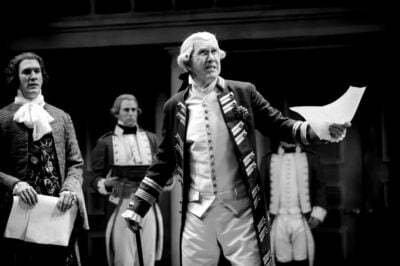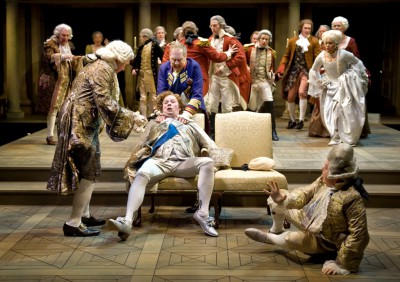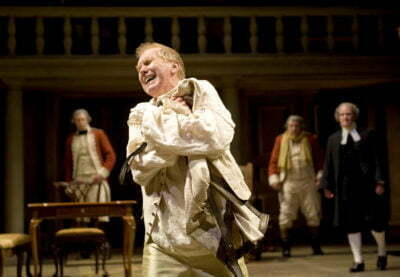The Madness of George III
By Alan Bennett
Directed by Penny Metropulos
At Chicago Shakespeare Theatre
I am mightily abus’d; I should ev’n die with pity
To see another thus.
– King Lear
Allan Bennett is an exceptional writer very British with a knack for history: his degree from Oxford is in the subject. As such, the historical nature of his works is unsurprising; and although here his name is most often paired with The History Boys, his 2004 play, it was neither his first foray into the historical, nor his last. Indeed, he seems to have a fascination with the Monarchy: Anglophiles will know his follow-up to The History Boys, the delightful book The Uncommon Reader; and of course there is the piece we are here to discuss, The Madness of George III. It is an altogether honest piece about the English monarchy, even where liberties are taken: both sympathetic and incisive.
 The play opens with King George III, who only recently lost The Colonies, fighting Parliament to reassert his slightly flagging power. The Whigs are attempting to curtail the King’s powers, and implement their agenda, including the abolition of the West Indian slave trade. The Tories, led by George’s right-hand man, William Pitt the Younger, are looking for ways to bolster the King’s power. In the middle of this Parliamentary bickering, George falls ill, and gets worse and worse until he is quite mad. The Tories then try to keep him in power for as long as possible, while the Whigs want to appoint the Prince of Wales (who is more sympathetic to their causes) as Regent; much Parliamentary finagling ensues.
The play opens with King George III, who only recently lost The Colonies, fighting Parliament to reassert his slightly flagging power. The Whigs are attempting to curtail the King’s powers, and implement their agenda, including the abolition of the West Indian slave trade. The Tories, led by George’s right-hand man, William Pitt the Younger, are looking for ways to bolster the King’s power. In the middle of this Parliamentary bickering, George falls ill, and gets worse and worse until he is quite mad. The Tories then try to keep him in power for as long as possible, while the Whigs want to appoint the Prince of Wales (who is more sympathetic to their causes) as Regent; much Parliamentary finagling ensues.
 Although there are a lot of politics in this play, at its heart George III is about the human condition, the humanity of the “divine” monarch. Four different doctors try to cure the ailment, all using the brutal medical practices of the time; three have no effect, but the fourth may (or may not – George says it was time that cured him). It is a remarkable play; one is reminded of Lear – a fact that does not escape Bennett: he has the King and his men read a scene from the play during his recovery. There is a plethora of powerful monologues and powerful moments.
Although there are a lot of politics in this play, at its heart George III is about the human condition, the humanity of the “divine” monarch. Four different doctors try to cure the ailment, all using the brutal medical practices of the time; three have no effect, but the fourth may (or may not – George says it was time that cured him). It is a remarkable play; one is reminded of Lear – a fact that does not escape Bennett: he has the King and his men read a scene from the play during his recovery. There is a plethora of powerful monologues and powerful moments.
And Chicago Shakespeare does generally well with the material. It should be said, before anything else, that Harry Groener is excellent as King George III. He gives an outstanding performance, subtle, pained, and altogether human. Nathan Hosner was the other stand-out, to my mind. His Pitt was noble, thoughtful, loyal, and conniving. Several others were also quite strong, but on the whole the ensemble felt sturdy but unexceptional.
And, frankly, I found the decisions regarding the political parties in the play simplistic. It sort of came down to “Tories good, Whigs bad,” which, I think, is far from the truth in the text. To me, the two sides are closer to Brutus and Caesar than to Richard and Richmond. The Tories are more conservative, the Whigs more progressive, but they both want what they believe will be best for their country. Though not without the typical hypocrisy that comes with politics: the Tories, who typically want a strong monarch, wish to curtail the powers the Regent will have; while the Whigs, who are not as royalist as their Tory counterparts, want the Prince as strong as possible. Why is this? Ultimately, because Pitt will lose his power as Prime Minister if the Whigs take over the government; and Charles Fox, the leader of the Whigs, will suddenly become PM himself. These men are not saints. And yet, director Penny Metropulos decided to have this uncomplicated – not to say incorrect – reading of the text. Pitt was this noble general who was only looking out for the King, and Fox was a dirty, scheming fiend. There was not enough gray.
Still, this is a wonderful play, and a strong production: the costumes are excellent, the lighting most fine, the set simple yet highly functional. It is also a newly-cobbled script, from the original play (which was 4 hours long), the changed script for its American premier, and the screenplay for the movie (The Madness of King George); which I suppose is neither here nor there. And, not to repeat myself, but Harry Groener’s performance is worth seeing – period. This is a very watchable piece of theatre, and a skipping 2 hours and 45 minutes.
Recommended
Will Fink
Reviewed on 4.20.11
For full show information, go to the page for The Madness of George III at TheatreinChicago.
Beverly Friend’s take on The Madness of George III
POWERFUL! That’s the all-encompassing word both for this production of
The Madness of George III, and for Harry Groener’s amazing acting skills
in the lead role. What a complex character George is, and what a range
of emotions Groener must evince to capture his multi-faceted persona. He
must be regal as king, able to move from initial suffering to angst with
the hideous progression of his disease while being labeled and behaving as
mad, agonizingly at a the mercy of inept doctors and a potentially
regicidal son. The King’s pain is palpable. Groener masters each erratic
gesture, each irrational expression, each nuance, at one point tied to a
chair, his moving, splayed hands with their outstretched, grasping
fingers, reach out to pull at our horrified understanding. At play’s end,
not only did Groener get a well-deserved standing ovation, it happened
just as spontaneously as one reads it described in books: “the audience
rose in unison.” According to the playbill, talented Groener, who has been
nominated for three Tonys, is making his debut with the Shakespeare
Theater for this play. Please, can we keep him?
Highly Recommended
Date Reviewed: April 20, 2011


We saw the performance last night. It was truly an example of great acting most especially by Mr. Groener. The audience did rise without plan. Everyone was overwhelmed by the viewing of a thrilling and very sensitive perfect performance. The whole cast was great.
We are so fortunate to have Shakespeare Theater in Chicago.
I have been attending theater for over 50 years. This was one of the finest performances I have ever had the pleasure to see. Mr. Groener was wonderful…